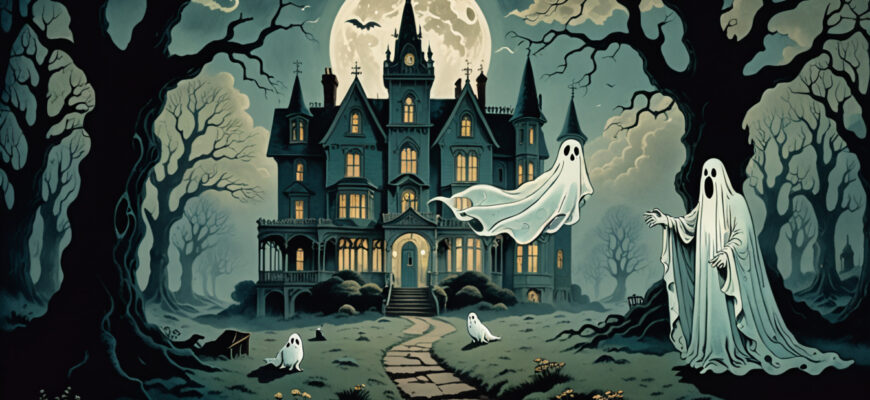Dreams about ghosts can shake us awake with a chill, but they often carry a deeper message than just fright. Why do these ethereal figures show themselves when the world quiets down? Ghost dreams aren’t just about spooky shadows—they often symbolize emotional and spiritual layers we haven’t fully faced. They emerge from the unseen corners of our psyche, where unresolved regrets, grief, or memories linger, gently nudging us to pay attention. These encounters in sleep reveal parts of ourselves that stay tucked beneath the surface, whispering through spectral forms what we might be avoiding in our waking life.
- What Are Ghost Dreams?
- The Emotional Undercurrents Behind Ghost Dreams
- The Invitation to Face Inner Shadows
- Cultural and Spiritual Meanings of Ghosts in Dreams
- Psychological Perspectives on Ghost Dreams
- Ghosts as Projections of Past Trauma and Regret
- Dreams as a Mirror of Emotional Wounds
- Using Dreamwork to Reclaim Lost Parts of Self
- Spiritual & Astrological Interpretations
- Astrology as a Tool for Understanding Ghost Dreams
- Spiritual Practices to Engage With Ghost Dreams
- Self-Knowledge as Liberation Through Dream Healing
What Are Ghost Dreams?
Ghost dreams serve as emotional and spiritual symbols—they manifest as the echoes of feelings, stories, or memories searching for expression. When you dream of a ghost, it’s rarely about the supernatural alone; it’s about something within the heart or spirit that hasn’t found rest. These figures often arise during sleep because that’s when the subconscious speaks loudest, loosening the grip of daily defenses and allowing hidden truths to surface. The ghost becomes a symbol for what’s unfinished, what haunts from the inside out.
The Emotional Undercurrents Behind Ghost Dreams
Underneath the eerie images, ghost dreams channel emotional undercurrents like past memories that refuse closure, unresolved regrets clinging to the soul, or grief that still aches. These dreams can feel unsettling, but they also provide a mirror reflecting what we try hard not to see or feel. Sometimes they’re about moments once left unspoken or wounds we hoped time would heal but didn’t. The ghost’s presence asks us to consider: Which chapter of your story has been left open? What feelings have been locked away?
The Invitation to Face Inner Shadows
Ghost dreams aren’t just about spirits; they often represent parts of ourselves that feel insecure, guilty, or tangled up in difficult relationships. These nocturnal visitors invite us to step gently toward the shadows within—the layers of fear, shame, or uncertainty that we tend to avoid. Behind their haunting forms are questions that matter deeply:
- What story hasn’t been told in your own life?
- Which fears or hurts are ready to be softened, acknowledged, or released?
Meeting these inner shadows can feel vulnerable but also freeing, a chance to transform what haunts us into a source of healing.
Cultural and Spiritual Meanings of Ghosts in Dreams
Across cultures, ghosts in dreams have woven themselves into rich traditions of meaning that go beyond fear. In many Indigenous and ancestral beliefs, dreaming of ghosts connects us with the voices of those who came before—ancestors reaching across time to offer guidance or warnings. Whether it’s the spiritual echoes in Chinese folklore or the ancestral shades of Indigenous stories, such dreams ask us to listen closely to inherited energies that ripple through our lives.
At the same time, ghosts act as reflections of our inner shadows. Psychologically, they mirror parts of us that need integration—unhealed emotions, suppressed desires, or conflicts that stay below conscious awareness. Spiritually, these dreams can mark a call from the soul to heal fragmented pieces and reclaim wholeness. The ghost becomes less a threat and more a cryptic guide, nudging us to bring light where darkness has settled.
| Culture or Tradition | Ghost Dream Meaning | Role of Ancestors/Energy |
|---|---|---|
| Chinese Tradition | Sign of warning, potential illness or neglected family matters | Strong ancestral vigilance and familial connection |
| Greek Mythology | Communication with underworld, secret truths emerging | Ancestors acting as bearers of hidden wisdom |
| Indigenous Cultures | Spiritual messages or guidance from lineage | Active ancestral presence influencing the living |
Some of the most powerful ghost dreams happen when spiritual awareness begins stirring, signaling growth along a personal journey. The spirits you see might feel mysterious or unsettling, but they can serve as guides, helping you navigate emotional terrain and awaken to deeper truths about yourself and the world. Honoring ghosts in dreams as messengers—not enemies—opens doors to transformation and spiritual awakening.
Psychological Perspectives on Ghost Dreams
What does it mean when haunting figures appear in your dreams, making sleep feel less like rest and more like a reckoning? Ghosts in dreams often show up as vivid echoes of unresolved feelings lodged deep in the psyche. They’re rarely about the supernatural and more about what’s emotionally unfinished and clamoring for attention.
Ghosts as Projections of Past Trauma and Regret
Ghosts can be the mind’s way of replaying wounds and regrets that haven’t been fully processed. Imagine those forgotten corners of your heart where grief and guilt still linger, unspoken and raw. In sleep, the subconscious picks up these threads, weaving them into shadowy figures that stand as projections of pain or mistakes you haven’t yet made peace with. Dreams act as a nightly workshop where the brain works through emotional puzzles, often without the filter of waking logic. What can’t be solved during the day sometimes gets dramatized in ghostly form at night, nudging us to acknowledge those old narratives.
Dreams as a Mirror of Emotional Wounds
Guilt, shame, and insecurity don’t just stay tucked away; they often take on shapes and faces in dreams, appearing as ghostly visitors embodying those feelings you might avoid when awake. Think of that nagging sensation after a word left unsaid, a hurt you didn’t address, or a version of yourself feeling unseen and isolated. Recognizing these emotions as characters in your dream allows for a kind of inner dialogue — a moment where healing begins, not by running from fear but by sitting with it and letting it speak. That act of acknowledgment can dismantle shame and open doors to compassion.
Using Dreamwork to Reclaim Lost Parts of Self
Ghost dreams don’t have to be a source of dread. They can become a powerful tool for self-reclamation and integration. Techniques like journaling right after waking capture the details your memory might otherwise let slip away — every symbol, feeling, and fragment becomes data for deeper understanding. Active imagination invites you to engage directly with these dream figures, asking questions within the dream or visualizing peaceful conversations upon waking.
Try these approaches:
- Journaling: Document your ghost dreams with as much sensory detail as possible, then reflect on what emotions or memories arise.
- Active Imagination: Visualize meeting your ghost figure with curiosity and kindness, asking why it’s there and what message it carries.
- Naming: Giving your ghost a name or identity can turn fear into familiarity, transforming it from a haunting shadow into an acknowledged part of your inner story.
By befriending these spectral messengers, inner wounds can soften, and the lost or fragmented pieces of yourself can start to feel whole again.
Spiritual & Astrological Interpretations
Imagine the stars as ancient storytellers reflecting not just your outward path but the hidden realms where your ancestors whisper and your soul dialogues with the cosmos. Ghost dreams often appear as intersections between spiritual energies and personal growth, inviting exploration beyond the surface.
Astrology as a Tool for Understanding Ghost Dreams
Some places in the natal chart tap into ancestral roots and shadows, particularly the 4th house of home and family, the 8th house tied to transformation and the unseen, and Pluto’s deep undercurrents of death and rebirth. When planets like Neptune stir these areas, dreamscapes can become ethereal, blurring lines between the conscious and the spectral. Moon phases and planetary transits also color dream intensity. For example, a powerful New Moon or a Saturn transit might crank up the sense of reckoning or revisiting unresolved family karma, making ghost dreams surge with meaning and urgency.
Spiritual Practices to Engage With Ghost Dreams
Work with rituals that honor both release and reclaiming of energy:
- Meditation: Sit in quiet presence, inviting guidance from your dreams rather than fearing them.
- Energy Clearing: Use smoke cleansing with sage or palo santo, or sound clearing with bells to invite peace into your space after unsettling dreams.
- Ritual Writing: Write letters to your ghosts, real or symbolic, expressing what went unsaid or asking for forgiveness.
Approaching these dream ghosts through a queer and feminist lens can be especially powerful. It opens space for reclaiming your story on your terms — calling your ghosts out of shadows, stripping away shame and stigma, and owning your experience with fierce tenderness and empowerment.
Self-Knowledge as Liberation Through Dream Healing
Facing ghost dreams becomes a cosmic truth-telling session between soul and stars. These nocturnal visitors ask uncomfortable questions: What hides in the dark corners of your lineage? What energies need rebalancing? The work reflects not just personal healing but a deeper alignment with cosmic rhythms and the larger web of ancestry and identity.
You were born for this kind of truth-telling — where letting go, embracing shadow, and naming fears become an act of liberation. Each ghost dream is not just a haunting but an invitation to live fuller and clearer, stepping into your own power with grace and cosmic timing.








